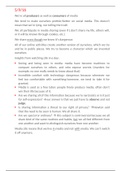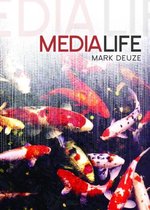5/9/16
We’re all producers as well as consumers of media
We tend to make ourselves prettier/better on social media. This doesn’t
mean that we’re lying, nor telling the truth
We all participate in media sharing (even if I don’t share my life, others will,
or it will be known through cookies, etc.)
We share even though we know it’s dangerous
All of our online activities create another version of ourselves, which we try
and be in public places. We try to become a character which we invented
ourselves
Insights from watching Life in a day:
Seeing and being seen in media: media have become machines to
compare ourselves to others, and who expose secrets (murders for
example; no one really needs to know about that)
Incredible comfort with technology: dangerous because whenever we
feel too comfortable with something/someone, we tend to take it for
granted.
Media is used as a free labor: people freely produce media, often don’t
win their life because of it.
Are we sharing all of this information because we’re narcissists or is it just
for self-expression? our answer is that we just have to observe and not
judge.
Is sharing information a threat to our right of privacy? Newton said
that the need to be seen is human. We all share it.
Are we special or ordinary? this subject is controversial because we all
share kind of the same routines and habits, but we all feel different from
one another and want to distinguish ourselves from one another.
Media Life means that we live in media and not with media. We can’t switch
it off anymore.
,All of the information produced is not stable. Before, information was stable
(archives). Now, it changes all the time. Is it alive.
The Truman Show: he lives in media. As soon as he comes close to
discovering the truth, the world adapts and doesn’t let him. It’s the same
with media. They’re adapted to our world.
We can say that technology and machines are alive because they do things
on their own (produce other machines for example).
Media is a way of sharing our lives and leaving a trace. It always has been
present. Before, cavemen used to draw on walls, now we send virtual
messages.
Technology disguises itself as being clear, sterile, neutral and perfect.
Media and information are ubiquitous and pervasive, intimate and
personal, and special and ordinary. (Special because we do special things
with it, and ordinary because we’re not even aware of it). Ordinary leads us
to take media for granted.
Mark Deuze (2011) “Media Life”:
Our life is lived in, rather than with, media – we are living a media life.
Media studies and media life:
In today’s media culture, where people increasingly move through the world assembling a
deeply individualized media system – in other words: living in their own personal information
space – such a viewpoint can form the basis of investigation and understanding of everyday life.
The suggestion here is to take an ontological turn in media studies – one that neither tries to
make media all-powerful, nor aims to ‘decenter’ media research in an attempt to focus more
specifically on the question how can we live, ethically, with and through media. Sonia
Livingstone suggests, a 21st-century media studies must be grounded in the assumptions that
‘[f]first, the media mediate, for better or for worse, more than ever before’. This mediation of
everything is premised on the increasing invisibility of media which, in turn, makes media
invisible from life.
Media life and society:
According to Bauman, people’s current endemic and, perhaps more importantly, undirected
uncertainty breeds a particular kind of fear.
2
,The key to considering what it means to live in a media life must perhaps be an appreciation of
the ‘off’ nature or, what Slavoj Zizek has theorized as a mode of parallax reality as lived
experience.
Discussion:
Media cannot be conceived of as separate to us, to the extent that we live in media, rather than
with media.
Situating media in rather than with, everyday life opens up ontological opportunities for
complexifying media research and additionally draws our attention to the wider social context
of finding, producing, editing and distributing meaning through ‘mass self-communication’.
Mark Deuze (2012/2016) “Media Life Preface”:
In Media:
You live in media. Who you are, what you do, and what all of this means to you does not exist
outside of media.
Today the uses and appropriations of media can be seen as fused with everything people do,
everywhere people are, everyone people aspire to be.
A media life is much more than media hardware, software, and content – it is also everything
we do with and in response to media: how we built and sustain relationships and family ties,
how we derive cultural status and social currency from the kinds of media we use, and the
various ways we more or less deliberately manipulate time and space by checking our email on
mobile devices, listen to audiobooks with noise-cancelling headphones, and record our private
participation in public proceedings with networked devices that simultaneously immediatize
and immortalize our lived experiences as they mediatize it.
A media life reflects how media are both a necessary and unavoidable part of our existence and
survival.
Media are ubiquitous – they are everywhere – and pervasive – they cannot be switched off.
The media life perspective recognizes one further quality of media: that they, as much as the
human brain, are intermediate. Media are not finished, nor static – but plastic and malleable.
Media thus broadly conceived, are any (symbolical or technological) systems that enable,
structure or amplify communication between people.
Life, on the other hand, is not just about surviving – it is about living a live life, a life worth
living, a form of liveness that goes beyond simply making it work from day to day.
At the heart of the media life project is the question what a good, passionate, beautiful, and
3
, socially responsible media life looks like.
Maintaining an outside to media makes us, as human beings, feel special.
The illusion that we can comprehensively control our media in fact preserves media as the
primary definer of our reality. If we let go of this deception – this dualist fallacy of domination
of man over machine (or vice versa) – it may be possible to come to terms with the world we
are part of in ways that are less about effects, things and what happens, more about process,
practice, and what can be done.
The heart of the media life project is the question how we can understand ourselves and the
world we live in if we accept, if only for a moment, that we do not live with, but in media.
I suggest that the key to understanding media is not to emphasize their difference but their
disappearance from our lives.
There is no necessary relationship between the technological and the social. The relations that
do exist are clearly both structural - machines are always social as much as they are technical –
and highly dynamic.
4







